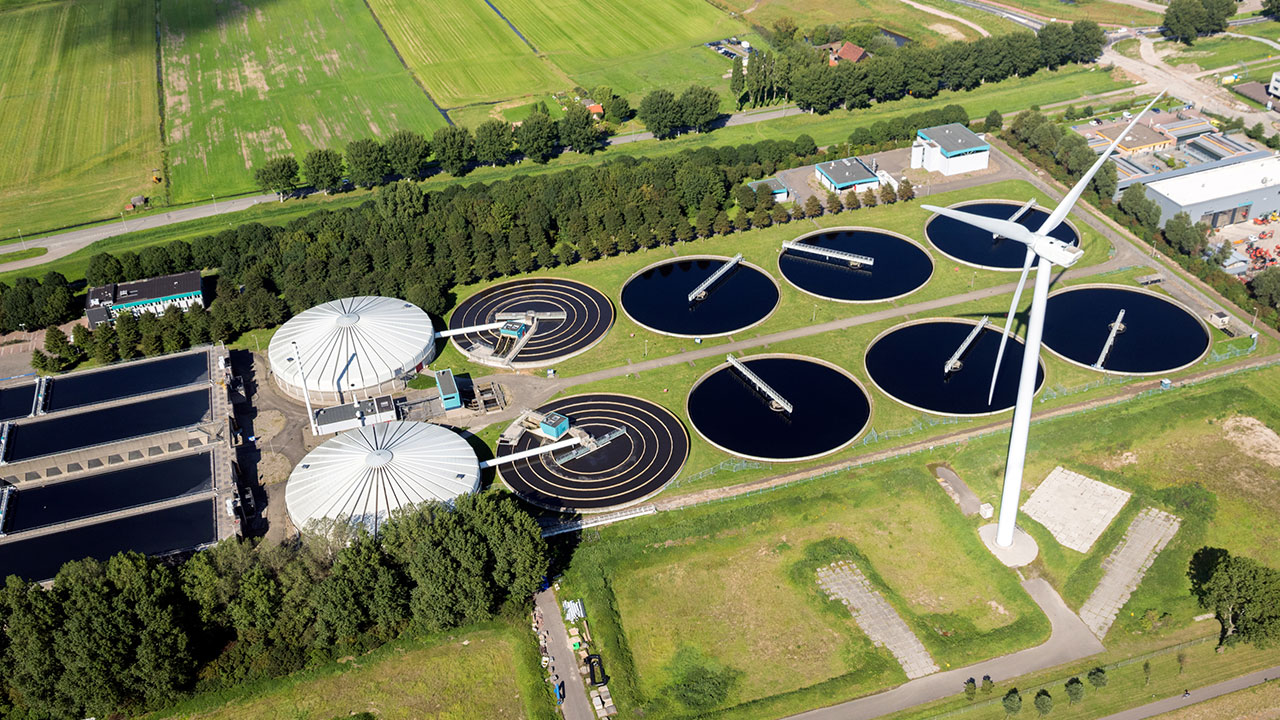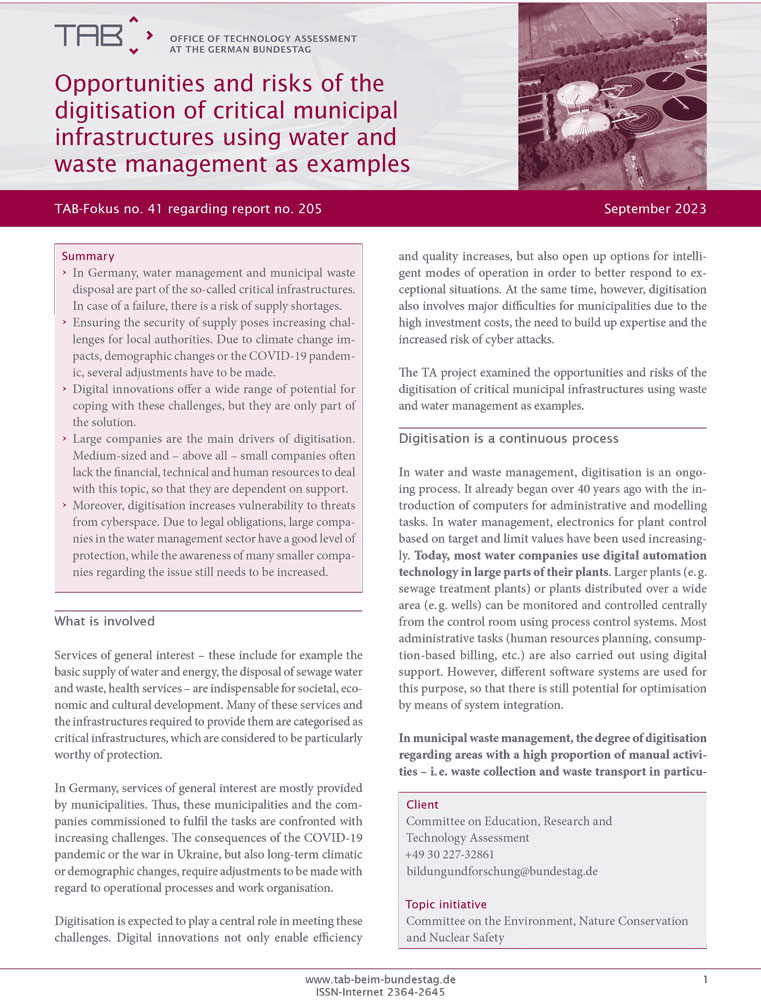
Opportunities and risks of the digitisation of critical municipal infrastructures using water and waste management as examples
- Project team:
Pauline Riousset and Saskia Steiger (Project Managers), Claudio Caviezel
- Thematic area:
- Topic initiative:
Committee on Education, Research and Technology Assessment; Committee on the Environment, Nature Conservation and Nuclear Safety
- Analytical approach:
TA project
- Startdate:
2019
- Enddate:
2023
Services of general interest such as basic water supply or the disposal of sewage water and waste disposal are indispensable for society and are often provided by municipalities. The consequences of the COVID-19 pandemic or the war in Ukraine, as well as long-term climatic or demographic changes, pose growing challenges for municipalities and the companies tasked with fulfilling these services. As part of the project, we have therefore investigated the use of digital solutions in water and waste management and identified ways in which the potential of digitisation can be sustainably exploited while ensuring the security of supply and disposal.
At a glance
sprungmarken_marker_3974
From stand-alone applications to integrated and autonomous systems
In water and waste management, digitisation is an ongoing process. It already began over 40 years ago with the introduction of computers for administrative and modelling tasks. In water management, electronics for plant control based on target and limit values have been used increasingly. Today, most water companies use digital automation technology in large parts of their plants. Larger plants (e. g. sewage treatment plants) or plants distributed over a wide area (e. g. wells) can be monitored and controlled centrally from the control room using process control systems. Most administrative tasks (human resources planning, consumption-based billing, etc.) are also carried out using digital support. However, different software systems are used for this purpose, so that there is still potential for optimisation by means of system integration.
In municipal waste management, the degree of digitisation regarding areas with a high proportion of manual activities – i. e. waste collection and waste transport in particular – is still comparatively low. In contrast, the public waste management authorities (German abbreviation “örE”) have already largely digitised many administrative tasks (e. g. billing of fees, electronic tracking of dangerous waste, etc.), although there is still potential for efficiency improvements – as for water management. Modern waste treatment plants are already equipped with digital automation technology. In this context, efforts are currently focussed on the further development of sensor technology for better waste separation.
The perspectives for digitisation in water and waste management can be found in the increased networking of existing individual applications to create ever larger integrated systems. The vision is to create largely autonomous overall systems that can be used in complex environments without human intervention. However, there is still a long way to go.
Digitisation to promote circular economy is still in its infancy
Digitisation is considered to have great potential in the waste management sector for more efficient operating processes and strengthening circular economy. Current activities of the local waste management authorities are primarily aimed at increasing business efficiency and optimising services, while there has been less focus on the recovery of recyclable materials in terms of a circular economy so far. This is due to systemic reasons, as municipalities currently benefit only little from the sale of recyclables. Here, the potential for greater resource conservation can be found rather in intensifying communication between the local waste management authorities and their customers in order to raise awareness of homogeneous sorting and prevention of waste, as well as with other industry players, e. g. to exchange information on the material composition of waste.
In future, care should be taken to ensure that investments in digitisation are more closely aligned with the objectives of waste hierarchy. This would require linking the information systems of local waste management authorities with upstream production and utilisation steps in order to document the materials and any toxic substances contained in products without interrupting the flow of information. In principle, however, digital solutions are only one part of a broader package of measures to be taken to establish a circular economy. This also includes, for example, ecological design and the reparability and reuse of products.


No water management 4.0 without a core data infrastructure
In particular, the increased acquisition, use, linking and analysis of water-relevant data promises new approaches for meeting the challenges water management is currently facing (e. g. preserving water quality, coping with extreme weather events, preventing water losses). At present, however, the required data is often only available in fragmented and isolated form on IT systems in different company divisions, at public authorities or other players, e. g. from industry or agriculture. Insufficiently compatible interfaces make data exchange even more difficult. In some cases, the data is missing completely, as pipe and sewer networks are currently still inadequately equipped with sensor technology, for example.
Innovations such as smart water meters, geographic information systems, digital twins or web-based data platforms are the basis for improved networking and an integrated use of data in water management. However, the diffusion of such digital technologies has only just begun. Diffusion is driven by individual innovative companies which – due to their size – have sufficient financial and human resources to test and introduce new technologies. In order to enable small and medium-sized companies to participate in digitisation as well, they could be supported by the state, e. g. through advisory services or financial subsidies for investments in technology or training of employees.
Digitisation supports crisis management – but the benefit depends on the specific event
In water management, dealing with disruptions and crises is no longer imaginable without at least the accompanying use of digital technologies. However, their benefit depends on the specific event. While digital applications, such as the process control system, are used intensively during a heat wave to make the best possible use of the limited water resources available through situation-adapted control, they can provide much less support during a power outage.
One consequence of advancing digitisation is that faults in the process flow are increasingly being eliminated automatically. This can lead to a gradual loss of expertise among staff, although human experience remains crucial for restoring normal operations. This is why the digitisation of critical infrastructures should be carried out with a sense of proportion.
Cross-company collaboration and investment in infrastructure and expertise are key
The greatest potential of digitisation can be found in the digital integration of systems, company divisions as well as upstream and downstream value-added processes. The digitisation of water and waste management could be supported politically by means of the targeted promotion of inter-company cooperation and measures to standardise data interfaces.
Inadequate infrastructural framework conditions often constitute an obstacle to the introduction of digital innovations. A funding priority should therefore be given to infrastructure expansion, e. g. for nationwide broadband coverage or for public cloud infrastructures. Finally, the development of expertise among employees in both sectors should be promoted in order to ensure the professional and safe use of the technologies.
The increased need for protection of IT systems might overburden smaller companies in particular
Advancing digitisation involves increased networking and complexity of IT systems in water management companies. This also increases the risk of human operating errors or technical failure. Deliberate cyber attacks are another growing threat – and the threat has even intensified since the outbreak of the war in Ukraine. Water management is part of critical infrastructures, which is why operationally critical IT security incidents must be avoided.
The German IT Security Act of 2015 sets the legal framework for information security in critical infrastructures. It obliges large companies in the water management sector to secure their business-critical IT systems according to the state of the art. For the vast majority of small and medium-sized companies, however, there have been no statutory regulations so far. This is why they only implement protective measures on a voluntary basis – if at all. In the future, however, the NIS 2 Directive – which is to be transposed into national law by October 2024 – will impose legal obligations on medium-sized companies as well to protect their IT systems.
The IT Security Act of 2015 has led to a significant improvement with regard to information security in large companies. In small and medium-sized companies, however, the level of protection depends in particular on the security awareness of the company management. In some cases, there is still a lack of understanding with regard to the threats to information security. In addition, limited financial and technical resources are often an obstacle to the implementation of protective measures. Nevertheless, many small and medium-sized companies are also proactively implementing measures to enhance information security within the scope of their capabilities.
Political support measures to promote information security in water management are a suitable approach for small and medium-sized companies. Often, the awareness of these companies regarding the issue first has to be increased. Moreover, due to their limited resources, they generally have to receive much more support than large companies. To achieve this, appropriate options include targeted information campaigns, government support for the training and further education of employees or stronger promotion of existing or the implementation of new funding instruments.
Digital technologies only part of the solution - digitisation needs political leadership
Despite the high expectations placed on the further advancement of digitisation in order to be able to cope with future challenges, digital technologies can only ever be part of the solution. Above all, the use of digital technologies is helpful if they are embedded in holistic strategies for the sustainable further development of waste and water management. Thus, digitisation must be shaped in order to make the best possible use of the potential involved and minimise risks. Politics can and must also contribute to this development.




